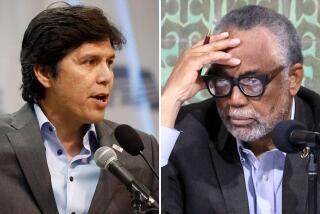Lawndale Buyout Foe Charges Censorship
- Share via
A Lawndale resident who opposes the City Council’s decision to sell its interest in the Galleria at South Bay for $10 million has claimed that the city clerk “censored” his comments against the buyout in the minutes of the council’s March 16 meeting.
Joining with Steve Mino on Thursday in asking the council to insert their criticisms in the minutes were Herman Weinstein, Nancy Marthens, Virginia Rhodes and Ralph Williams, all of whom spoke against the buyout on March 16.
At that meeting, the council voted 4-1, with Harold E. Hofmann dissenting, to give preliminary approval for the sale. Hofmann argued that the city told residents that it would keep the Galleria investment at least 10 years, and agreed with the five residents that the city might profit more by holding onto its interest in the mall.
Early in Thursday night’s meeting, Hofmann said he maintains that the city is making a mistake. But in an after-midnight vote, the council unanimously gave its final approval for the plan, which calls for investing and preserving the principal and spending only a part of the interest on city projects. Hofmann indicated that his vote was for the spending controls, not for the buyout.
Rankled by the claim of censorship, City Clerk Neil K. Roth defended his record-keeping practices and said he believes the council minutes have become “a political issue” in contentious Lawndale. He is an elected official whose four-year term will expire next April. Weinstein, Marthens, Rhodes and Williams all were candidates in the April, 1988, council race.
In a March 3 memo that was a response to a barrage of criticism that Mino and others made at recent council meetings, Roth stated that his policy is to take “action minutes” that record what the council does at each meeting.
To prepare a verbatim transcript, as Mino and others have sought, would be time-consuming and costly, requiring a much larger staff, Roth said.
Roth’s memo to the council contained a legal analysis from Bob Owen, a member of the law firm that represents the city, stating that “there is no legal authority to contradict” Roth’s position that action minutes are all that is required.
However, some cities do provide more extensive minutes, he said.
Owen notes that Roberts Rules of Order says: “The name and subject of (the) guest speaker can be given, but no effort should be made to summarize his remarks.” The city keeps audio and video tapes of the meetings.
Mino and other critics contend that in order to preserve their legal rights in the event they sue the city they need to show the court they have made their views known to the council.
But Owen said that a citizen does not necessarily need to provide council minutes reflecting his comments.
The council Thursday night directed Roth to amend the March 16 minutes to list the people who spoke for and against the issue.
The buyout agreement is the result of months of negotiations and public discussion. Proponents of the buyout contend that it is an excellent opportunity for financially troubled Lawndale to secure a lump sum well in excess of its $7-million annual budget.
Plans call for using a portion of the estimated $800,000-a-year interest income to provide programs the city otherwise could not afford.
$183 Million in Sales
But critics say the city would be better served by keeping its interest in the upscale Galleria, which racked up more than $183 million in taxable retail sales in 1987. Opponents also question the city’s ability to manage the buyout funds, and point to the city’s loss in 1987 of $1.68 million in a speculative securities investment. The staff has recommended that the city hire a full-time treasurer.
Lawndale acquired an interest in the Galleria in 1984, when it obtained an $8-million federal grant and loaned it to the developers of the $70-million mall in Redondo Beach. A more affluent city than Lawndale, Redondo Beach could not qualify for the economic development grant funds.
Under the agreement, Lawndale secured jobs for its residents, earned 6% interest on the loan and was promised an eventual share of profits at the mall.
No Share of Profits
Lawndale has not yet shared in mall profits, partly because the developer’s capital investments have reduced profits below the level at which Lawndale would be eligible to share.
Because of the likelihood that the developer will continue to make capital investments, it is uncertain when Lawndale would ever have been able to take advantage of this provision, according to the city’s legal and financial advisers.
Marthens and Rhodes, who had been appointed to city advisory panels, filed a request for a formal inquiry challenging Lawndale’s administration of the $8 million federal grant. That inquiry is still pending. The council, angered by what was perceived as a disloyal act, removed the two women from their city appointive posts.
More to Read
Sign up for Essential California
The most important California stories and recommendations in your inbox every morning.
You may occasionally receive promotional content from the Los Angeles Times.













